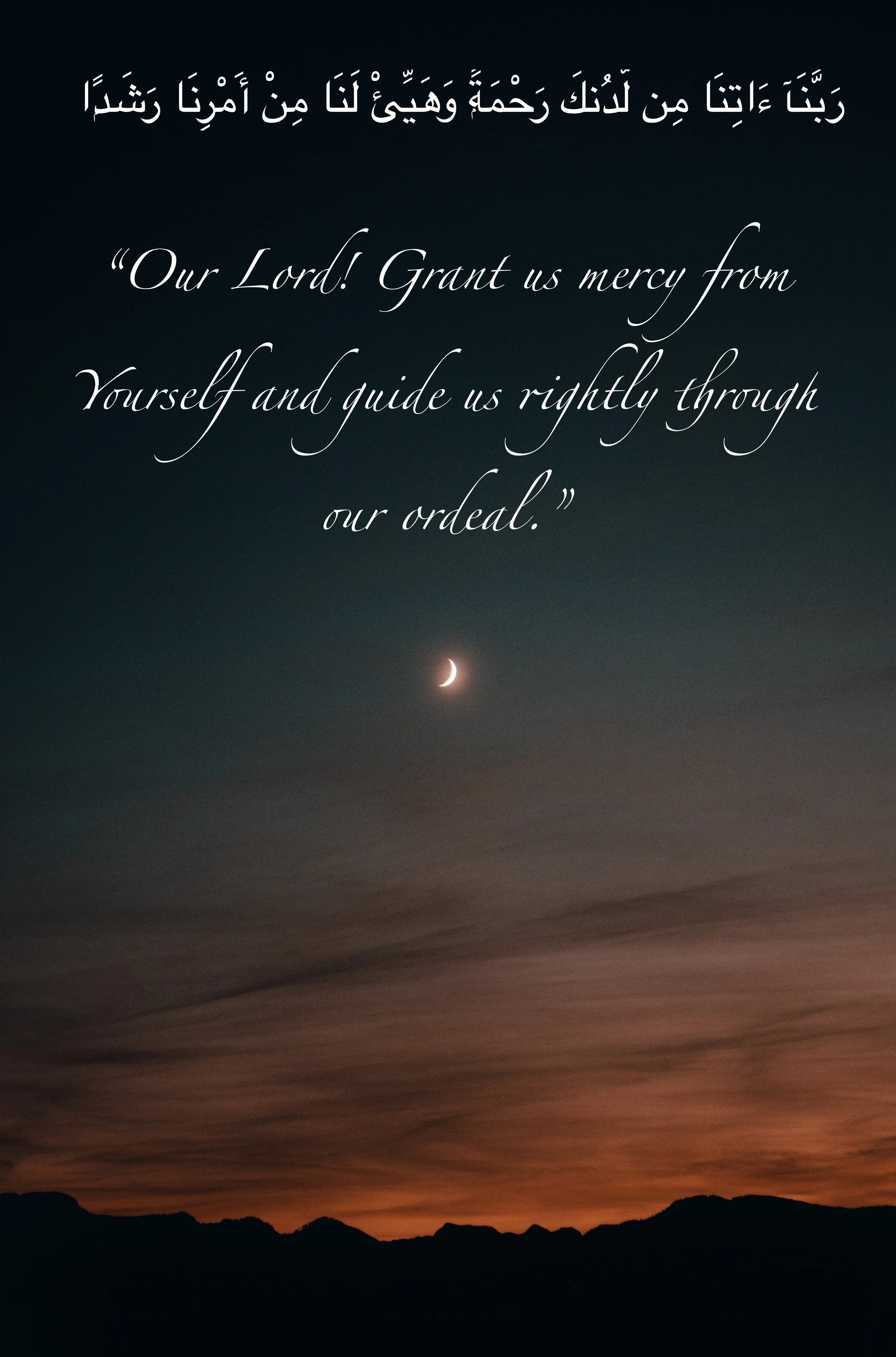Ramadan Reflections 1444/2023 Part 10
Surah Al-Kahf Verses 1-8
Surah Al-Kahf, Chapter 18 of the Qur'an, recited every Friday, is full of stories of the past, with profound lessons for the present. The Surah takes its name from the first story of the young men who fled to the cave fearing persecution by the King for their beliefs. A cave is a symbolic place of protection, like the Cave of Hira and the Cave of Thawr. So the whole Surah is a protection for those who recite, read, and ponder over it. The central theme explored throughout the Surah is that God protects those who seek His protection. So if we flee persecution, abuse, and oppression and we seek His protection as we make our decisions, He will provide it.
بسم الله الرحمن الرحيم
“Praise be to God Who has revealed to His worshipper, the Book devoid of all crookedness; an unerringly Straight Book” meant to warn of a stern punishment from God, and to proclaim, to those who believe and work righteous deeds, the tiding that theirs shall be a good reward, wherein they shall abide for ever.
[Verses 1-3]
1. ‘Alhamdulillah’, Allah is deserving of praise for sending down the Gift of the Qur’an, a Living Miracle (in its eloquence, wisdom, preserved nature, healing properties, a criterion and so much more), to the Prophet ﷺ, and through the Prophet to us, his followers. The Prophet ﷺ here is referenced as His Abd, the highest station given to a soul, bestowing the Prophet ﷺ with the highest rank of ‘worshipper’.
2. The Qur’an (recited) is a weighty kitaab (written down) and the Credential of the Prophet ﷺ. The Qur’an is the ultimate Proof of his Prophethood ﷺ. The ‘kitaab’ is a straight guidance, devoid of crookedness - it is a Sign of Authenticity that the Prophet ﷺ and his Message, the Risalah, is true. The Book contains glad tidings and dire warnings.
3. In the first few verses, Allah has combined the three fundamentals of Islam - Tauheed (Praising the Oneness of God), Risalah (The Message) and Aakhira (Hereafter).
4. Also, in the first few verses, the three pillars of Imaan have been referenced - Loving Allah (Alhamdulillah), Fearing Allah (Punishment), Having Hope in Allah (Glad Tidings of an Eternal Reward).
“It warns those people who assert, ‘God has offspring. They have no knowledge about this, nor did their forefathers––it is a monstrous assertion that comes out of their mouths: what they say is nothing but lies. (O Muhammad), if they do not believe in this Message, you will perhaps torment yourself to death with grief, sorrowing over them.
[Verses 4-6]
These verses contain some dire warnings to the people and comfort for the Prophet ﷺ.
1. Do not to associate partners or offspring to the Lord. The Quraish claimed that Allah had daughters while they themselves revered sons and buried their daughters alive.
2. One of the greatest of sins is to speak about Allah, the Messenger and Islam without knowledge.
3. Do not lie. The main purpose of the Qur’an, the final message is to negate falsehood. It is the criterion of right and wrong. We cannot deviate from the truth after Guidance has been bestowed upon us. Shaytaan has boldly made his promise that he would lie in wait for humanity in every nook and cranny to cause us to lie. Even though lies have been invented against Allah, He the Most Merciful and Forbearing of mankind and their foibles.
4. The Qur’an is The Book through which we get to know Allah and His Messenger ﷺ and all the Messengers and sages who came before the final Prophet Muhammad ﷺ, Seal of the Prophets.
5. The Prophet ﷺ was grieved that his people would not believe in the message of truth and they turned away from their Creator by turning away from their Prophet ﷺ and his message. The Prophet ﷺ loved his Lord, he loved the message and he loved his people. His heart yearned to bring all three together, so everyone would be successful in this life and the next. Allah is acknowledging the Prophet’s ﷺ pain, offering him comfort that his Lord knows his heart, just as the Prophet ﷺ acknowledged the pain and sorrows of his people, and offered them and us (through the hadith literature) comfort, succor and advice.
“Surely, We have made what is on earth an adornment for it so that We test them as to who among them is better in deed. And indeed, We will make that which is upon it [into] a barren ground.
[Verses 7-8]
1. Everything above the earth is an adornment: men, women, children, the wonders of nature, wealth and possessions. Everything that is contained in the planet is beautification for this world only. All of this adornment is a means of testing us to see which of us performs the best of deeds. It’s all about the quality of our deeds and not the quantity of our deeds. All deeds are judged by their intentions. Small deeds that may seem negligent in the eyes of the people, may weigh heavily on the scale of good on the Day of Reckoning and conversely, large deeds in the eyes of the people may be negligent in the scale of good deeds in the hereafter.
2. The time will come (the Day of Judgement) when We will make all this beauty and adornment that we see into a barren, flat, infertile, unproductive land. So don’t put your heart and soul into what is in this world because it is deceiving and instead, we must focus on the deeds we carry into the hereafter.
*Disclaimer: I'm not a scholar and I don't claim to be one. I'm a seeker of knowledge and I love sharing what I learn. These notes are based on the lectures of Shaykh Yaser Qadhi, available on Youtube.
والله أعل
